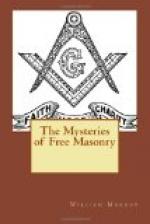to the Treasurer, “Your duty there, Brother Treasurer?”
He answers, “Duly to observe the Worshipful
Master’s will and pleasure; receive all moneys
and money-bills from the hands of the Secretary; keep
a just and true account of the same; pay them out by
order of the Worshipful Master and consent of the
brethren.” The Master to the Treasurer,
“The Junior Warden’s place in the Lodge,
Brother Treasurer?” He answers, “In the
South, Worshipful.” Master to Junior Warden,
“Your business there, Brother Junior?”
He answers, “As the sun in the South at high
meridian, is the beauty and glory of the day, so stands
the Junior Warden in the South the better to observe
the time; call the crafts from labor to refreshment;
superintend them during the hours thereof; see that
none convert the hours of refreshment into that of
intemperance or excess; and call them on again in due
season, that the Worshipful Master may have honor,
and they pleasure and profit thereby.”
Master to the Junior Warden, “The Senior Warden’s
place in the Lodge?” He answers, “In the
West, Worshipful.” Master to the Senior
Warden, “Your duty there, Brother Senior?”
He answers, “As the sun sets in the West, to
close the day, so stands the Senior Warden in the
West, to assist the Worshipful Master in opening his
Lodge; take care of the jewels and implements; see
that none be lost; pay the craft their wages, if any
be due; and see that none go away dissatisfied.”
Master to the Senior Warden, “The Master’s
place in the Lodge?” He answers, “In the
East, Worshipful.” Master to the Senior
Warden, “His duty there?” He answers, “As
the sun rises in the East to open and adorn the day,
so presides the Worshipful Master in the East to open
and adorn his Lodge; set his crafts to work with good
and wholesome laws, or cause the same to be done.”
The Master now gives three raps, when all the brethren
rise, and the Master, taking off his hat, proceeds
as follows: “In like manner so do I, strictly
forbidding all profane language, private committees,
or any other disorderly conduct whereby the peace
and harmony of this Lodge may be interrupted while
engaged in its lawful pursuits, under no less penalty
than the by-laws, or such penalty as a majority of
the brethren present may see fit to inflict.
Brethren, attend to giving the signs.” [Here
Lodges differ very much. In some they declare
the Lodge open, as follows, before they give the sign.]
The Master (all the brethren imitating him) extends
his left arm from his body, so as to form an angle
of about forty-five degrees, and holds his right hand
traversely across his left, the palms thereof one
inch apart. This is called the first sign of
a Mason—is the sign of distress in this
degree, and alludes to the position a candidate’s
hands are placed in when he takes the obligation of
an Entered Apprentice Mason. The Master then draws
his right hand across his throat, the hand open, with
the thumb next to the throat, and drops it down by
his side. This is called the due-guard of an
Entered Apprentice Mason (many call it the sign), and
alludes to the penalty of an obligation. The Master
then declares the Lodge opened in the following manner:—“I
now declare the Lodge of Entered Apprentice Masons
duly opened for the dispatch of business.”
The Senior Warden declares it to the Junior Warden,
and he to the brethren. “Come, brethren,
let us pray.”




